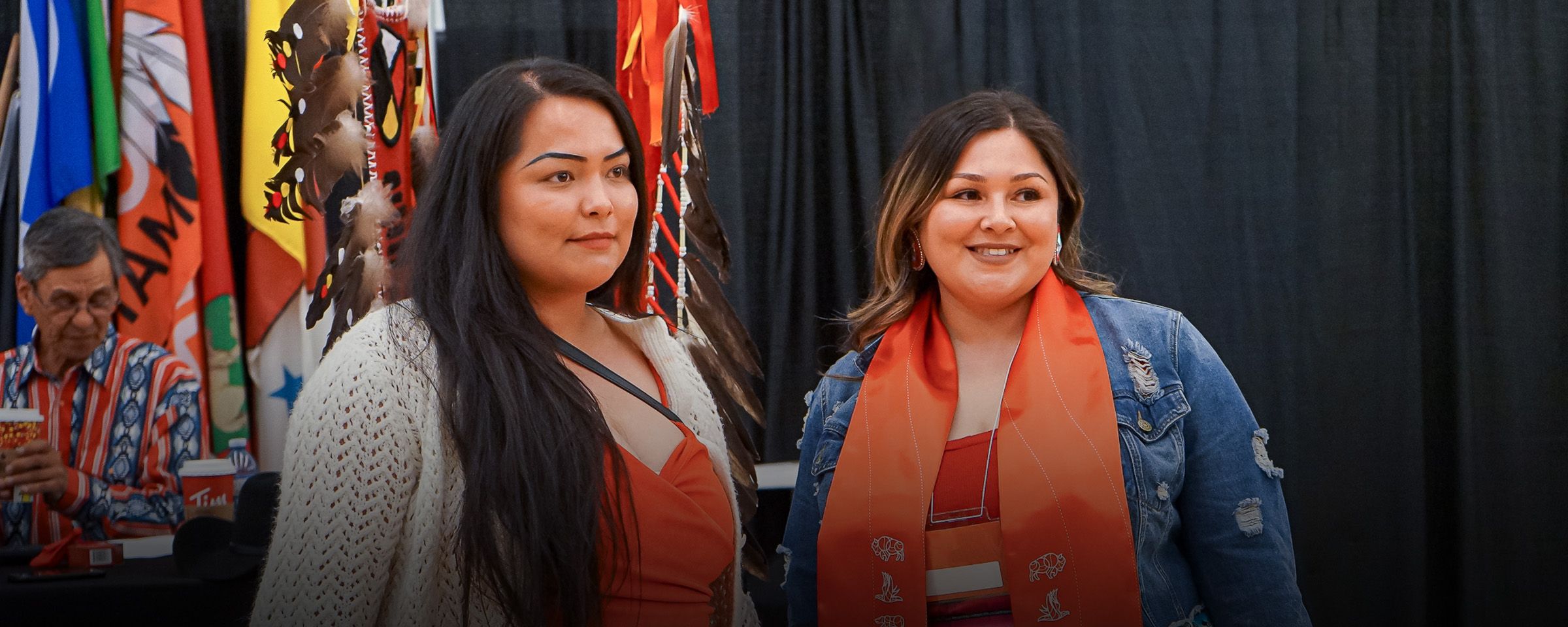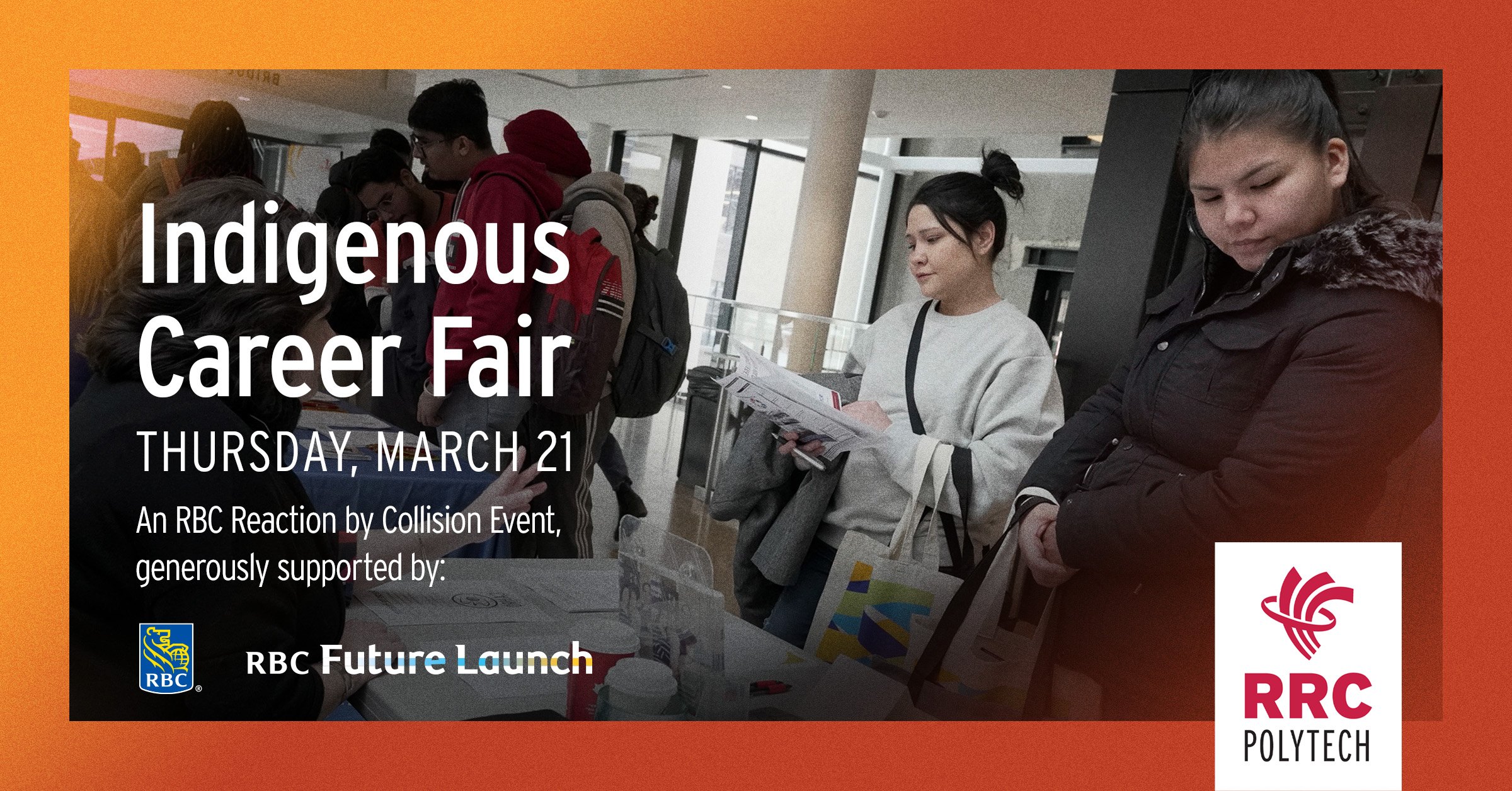Indigenous Career Fair – An RBC Reaction by Collision Event: Thursday, March 21
Get your resume ready and join us for the Indigenous Career Fair in the North Gym at Notre Dame Campus on March 21st from 12pm – 4pm.
Speak with employers from over 30 organizations representing various industries who have job openings and opportunities for Indigenous students and graduates. View the job listings online and learn about the kind of opportunities available to you! The Indigenous Career Fair will kick off with a panel of Indigenous professionals to discuss breaking into industry and navigating the job search.
The RBC Headshot Lounge, courtesy of RBC, will be open for you to take professional headshot photos for your LinkedIn and other bios.
A hot dog lunch will be available for attendees.
Register here for a chance to win awesome prizes!
Keep an eye on Student News or subscribe to the Indigenous blog for up-to-date information and reminders for our events!
Thank you to RBC for their generous support of the Indigenous Career Fair – An RBC Reaction by Collision Event.
Career Fair Tips
If this is your first Career Fair or one of many you’ve been to, it’s better to be prepared ahead of time so you know what to expect! Knowing what you want will increase your chances of finding a career that fits you.
What should I wear?
There’s no dress code for the Indigenous Career Fair, so what you usually wear to class will work! T-shirts, long-sleeved shirts, or button-up shirts with solid colours or simple patterns paired with jeans, pants, or skirts are usually what you might see at networking events like career fairs. Just keep in mind—you’re making a first impression with potential employers!
What should I bring?
The main things you’ll want to bring are your resume and an idea of what kind of job you want. Print a few copies of your resume in case you want to leave some with employers. Five to ten copies should be fine, but if you need to print more, printers are available throughout the campus that you can access using Paperclip.
The other thing you might want to bring is a notepad, in case there’s information you want to keep track of when you’re chatting with employers. We’ll provide pens at the registration desk, so we’ve got you covered!
I made a connection! What now?
Fantastic! You’ve hit it off with an employer, you left your resume with them, and they said they’d follow up; or, best-case scenario, they schedule an interview with you. What do you do now?
First thing’s first: get their contact information. It can be a general intake email or phone number, or the direct contact information of the hiring manager. Direct contact information with the hiring manager is better, since you’ll be able to address them by name in the follow-up.
Once the career fair is over, make the first move! The next day or the day after, send them an email or call to confirm the appointment if you’ve made one, or if not, just to thank them for their time at the career fair. Reference anything you might’ve talked about, and that will solidify you in their minds as a strong, interested, and confident candidate. If you didn’t get an interview at the career fair, this might just be the thing that tips the balance in your favour and land you that interview.
If that’s too bold for you, that’s okay too—just make sure that you remember their number, save it in your phone, or be open to calls from unknown numbers. It might be them following up with you!
Questions for Employers
You know what’s most important in a job for you, but here are some questions to get you started. These questions to ask employers can help you decide if you want to throw your hat in the ring for their job posting.
What position are you hiring for?
The most important answer for you to know.
You might know which positions you want, but then again you might not—it’s a good idea to go over your own skillset and to research roles you think you would be good at beforehand.
Even if the position sounds like it doesn’t align with your skillset, keep chatting! Be curious, find out what kind of person they want for the role. It might surprise you—you may actually have the right skillset, or they might ask for your resume to keep on file if a more fitting position opens up in the next few weeks or months. Every booth is an open door!
What responsibilities come with this role?
Usually this is the follow-up information when they tell you the title of the position. This information will help you determine if the role is aligned with your current skills and goals.
If only half of the responsibilities sound like things you know how to do, don’t worry! Organizations might have opportunities for their employees to develop professionally and may provide training for things you don’t know how to do yet. It can pay off in the end for an organization to train the employees they have or the employees they hire on (like you!), rather than continually look for someone that checks off all their boxes right off the bat. What’s valuable to them is your willingness to learn with them.
So, if you want to stand out, be honest! You don’t have to share what you can or can’t do right now, but if you snag an interview with them later, be honest about what you can do or have experience with. Even if you don’t check all their boxes, let them know that you’re willing to learn on the job! It gives them a sense of what to expect of you in that position and where they can help you grow, and what you can provide them with when you start (and so they aren’t overloading you with things you don’t know how to do yet).
What is the pay rate?
Pay is a huge factor when considering your job options. If they don’t volunteer this information, don’t be shy to ask! Everybody needs to know what their compensation will look like to know if they want to pursue an opportunity.
A good thing to know when deciding if a wage or salary is sufficient for you, a living wage in Winnipeg is $18.35 an hour full-time (or $36,700 annually) for both parents of a family of four, according to the Canadian Centre for Policy Alternatives as of August 2022. (Living wage means to be able to pay off all your expenses like groceries and bills from month to month.)
A lot of employers will say the pay varies, but generally they’ll give you a range like $40,000 – $45,000 a year, which is something you can negotiate when you get to the interview part of the hiring process. It’ll depend on what you ask for and your qualifications.
What are the benefits?
This will depend on the hours of the job. If it is full-time, salaried, then there will usually be benefits like dental coverage, eyecare coverage, mental health care coverage, among others. Positions that are not full-time will have limited additional benefits.
Coverage means the organization will reimburse the cost up to a specified amount each year. For example, you could claim up to $1000.00 per year in coverage for mental health services like therapy or psychological evaluations. They will pay up to $1000.00 to your provider, and after that amount, you will be responsible for the costs.
Another way organizations might cover your benefits is providing a certain percentage for each instance you use a covered service. For example, your employer might cover 80% of your dental cleaning service, so you only have to pay the remaining 20%.
Organizations will often use a third-party service, like Blue Cross or Canada Life. They’ll go over your benefit coverage in more detail once you’ve been hired on.
What’s your favourite part about working for this organization?
Anyone who enjoys their career and is trying to get new people on their team will love this question! Knowing what current employees like about their jobs can help you decide if the job and organization has potential to meet your expectations.
Asking a personal question like this is a great way to make a connection with people at the booths. It shows interest in the organization and the people that manage it. This question also serves a practical purpose: knowing why current employees like their organization might sell you on that organization too!
We’re looking forward to seeing you at the 2024 Indigenous Career Fair – An RBC Reaction by Collision Event! Students can register ahead of time for a chance to win awesome prizes!

